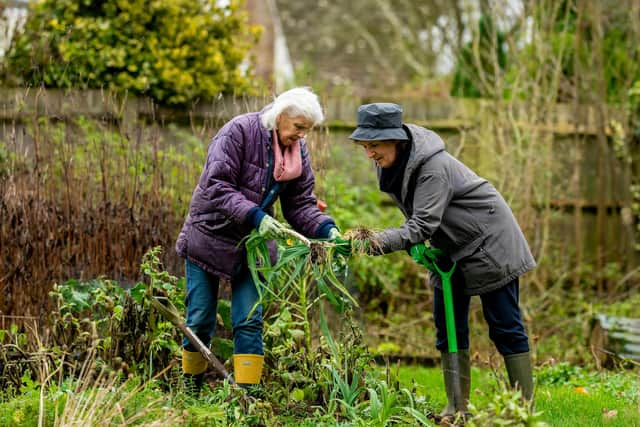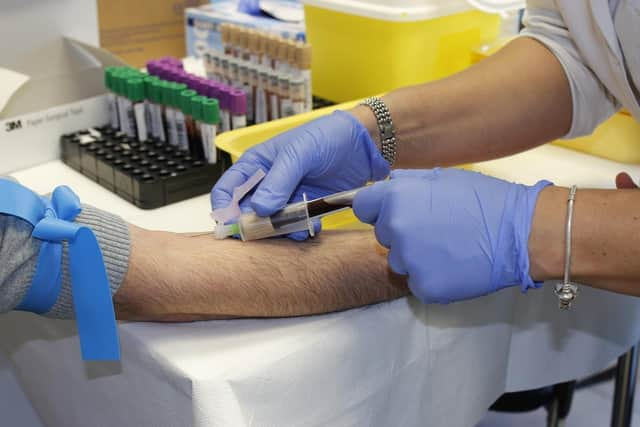Lancashire voluntary groups 'on their knees' after spike in NHS referrals for the patients who don't need a medic
and live on Freeview channel 276
That was the warning to an influential health and social care committee which heard how the voluntary, community, faith and social enterprise (VCFSE) sector in the region had come under pressure as a result of a rapid increase in what is known as “social prescribing”.
In recent years, the concept has become a widely-used method of helping individuals with non-medical issues which can nevertheless affect their health and wellbeing.
Advertisement
Hide AdAdvertisement
Hide AdIt usually involves patients being directed towards community groups who can support them with a range of socal, emotional and practical needs which do not require medical intervention, but do need addressing - such as isolation and financial problems.


Since social prescribing was included in the NHS Long Term Plan in 2019, its use has become widespread - and there are now 3,400 social prescribing “link workers” across England. They are the people who connect individuals with the local organisations that might be able to help alleviate their problems.
However, a meeting of the Lancashire and South Cumbria Integrated Care Partnership heard that the massive NHS investment in link workers in recent years had not been matched with the cash needed to expand the capacity of the groups to which those new staff are now referring so many patients.
The partnership - which is made up of local authorities, NHS organisations and VCFSE representatives themselves - has now agreed to become an early adopter of an initiative to create a “shared investment fund”, with the aim of ensuring a more structured and stable approach to funding organisations involved in putting social prescribing into practice.
Advertisement
Hide AdAdvertisement
Hide AdPartnership member Angela Allen - co-chair of the region’s VCFSE Alliance - said the voluntary sector had raised the alarm about the implications of social prescribing when it was first promoted as a policy.


“It was described as [like] having a million travel agents, but no destinations. There is no point in having brilliant social prescribers - of which there are many - if we don't have the organisations to be referred into and some sustainability for [them],” Ms. Allen explained.
The meeting heard that more than a quarter of people who attend appointments at their GP surgery do not have a medical need that clinicians can treat - while many of those that do come with a medical complaint also have some other social or practical support requirement.
Social prescribing referrals can be made to the likes of befriending initiatives, gardening groups, art classes and debt support agencies. The concept really took off after its inclusion in the NHS Long Term Plan back in 2019, since when more 2.5 million people have been in contact with a social prescribing link worker nationwide.
Advertisement
Hide AdAdvertisement
Hide AdDr. Victoria Ellarby, programme director for system reform at the Lancashire and South Cumbria Integrated Care Board, told the partnership meeting that a “bottleneck” had been created by the burgeoning of social prescribing, but welcomed the proposed shared investment fund as a way of showing a commitment to getting people the most appropriate support for their needs.


“I think we’ve all recognised there has been a history of over-medicalising many of these problems. The stats show that people present to the NHS because they don't really know where to go - and [at the NHS] the door’s open [and] the lights are on.
“But actually its wider determinants of health and a focus on prevention that this [plan] really puts the spotlight on,” Dr. Ellarby said.
Cllr Damian Talbot - integrated care partnership member and the cabinet member for public health, prevention and wellbeing at Blackburn with Darwen Council - said the growth in social prescribing had coincided with a spike in the number of people with “more and more complex [and] significant mental health needs”
Advertisement
Hide AdAdvertisement
Hide Ad“It’s grown exponentially…in the last five years and that, in turn, puts a strain on those who are in [the VCFSE] sector,” he said.


HELPING THE HELPERS
The integrated care partnership has agreed to work with the National Academy for Social Prescribing (NASP) to become an “early demonstrator site” for the latter’s proposals to create a social prescribing shared investment fund.
Claire Niebieski, head of population health for the Lancashire and South Cumbria Integrated Care Board, stressed that the commitment did not involve any investment from health and social care organisations in the region at this stage - but said that such a request was likely in the future.
She said that the aim was to develop a way of investing in the VCFSE groups on the frontline of social prescribing in an “organised and structured way” - and so boosting their capacity to offer support to those who need it.
Advertisement
Hide AdAdvertisement
Hide AdMs. Niebieski, who has recently carried out a review of social prescribing across the region, said she found that the VCFSE sector was “on its needs…in trying to respond to onward referrals”.
“Following the investment into social prescribing link workers, there hasn’t been an investment in VCFSE to support that,” she added.


The NASP says that “short-term, piecemeal funding from a wide variety of sources” puts the provision of social prescribing at risk.
The organisation wants its proposed shared investment fund to be worth at least £100m a year for the next decade - with integrated care partnerships contributing 90 pence per head of population in their area from a mix of local authority, NHS and philanthropic funds. That amount would be matched by what the NASP describes as a “core national investor”.
Advertisement
Hide AdAdvertisement
Hide AdIndividual funds would be held locally across integrated care partnership areas in order to ensure flexibility in how they are used.
According to an NASP presentation document from January, the aim of the shared investment fund is to “generate financial commitment from multiple sources and unlock ambitious levels of investment”.
However, it must not disrupt or be a substitute for current funding for link workers nor for NHS funding of its own clinical services, the organisation warns.
It says an ageing population and increasing rates of poverty are issues with social roots – and that the NHS “is often not equipped to deal with” the health implications that flow from them.
WHAT IS SOCIAL PRESCRIBING?
Advertisement
Hide AdAdvertisement
Hide AdSocial prescribing is “a means for trusted individuals in clinical and community settings to identify that a person has non-medical, health-related social needs and to subsequently connect them to non-clinical supports and services within the community by co-producing a social prescription - a non-medical prescription, to improve health and wellbeing and to strengthen community connections”.
Source: Global conceptual definition presented in British Medical Journal study
Comment Guidelines
National World encourages reader discussion on our stories. User feedback, insights and back-and-forth exchanges add a rich layer of context to reporting. Please review our Community Guidelines before commenting.